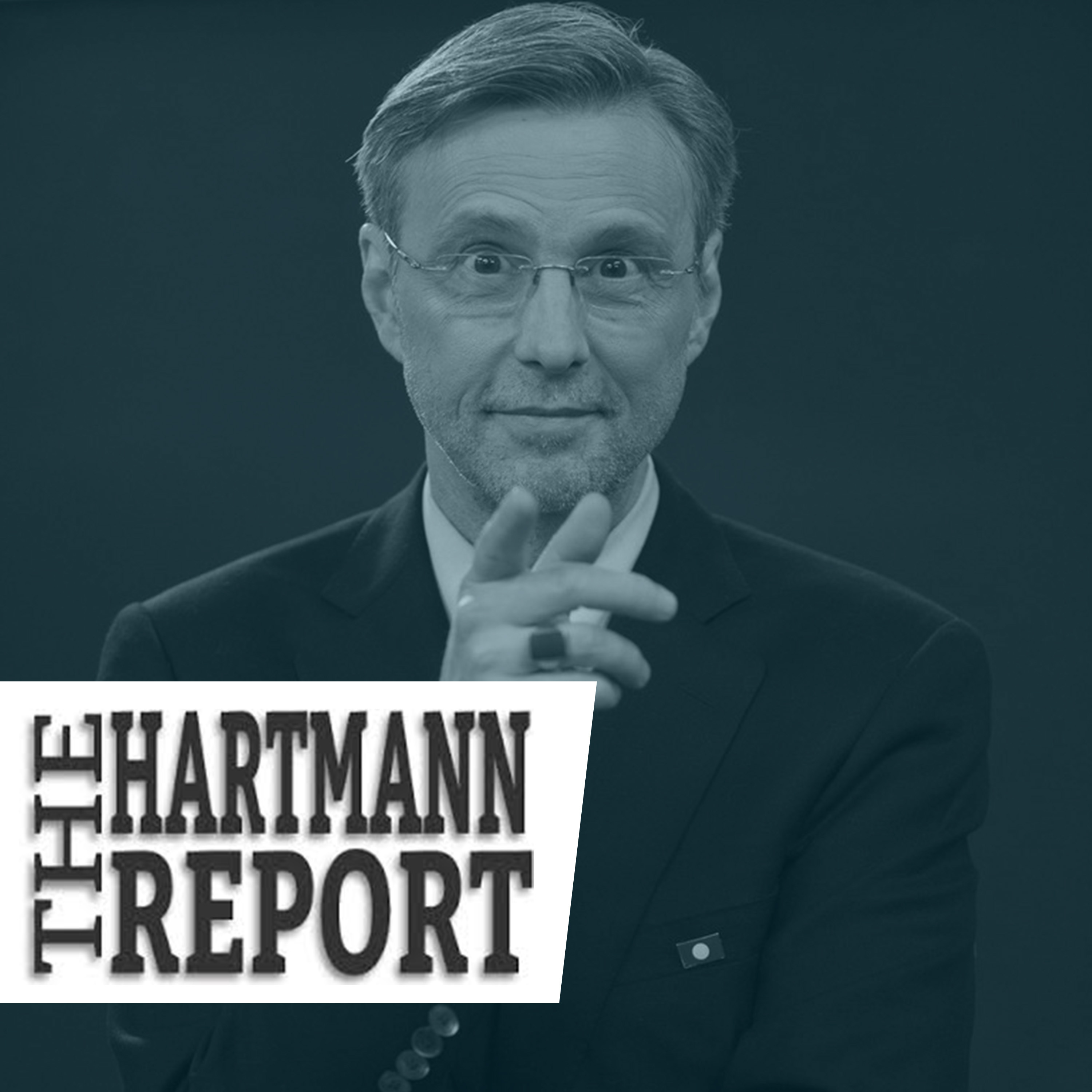
The Darrell McClain show
Independent media that won't reinforce tribalism. We have one Planet; nobody's leaving, so let’s reason together!! Darrell McClain is a Military veteran with an abnormal interest in politics, economics, religion, philosophy, science, and literature. He's the author of Faith and the Ballot: A Christian's Guide to Voting, Unity, and Witness in Divided Times. Darrell is a certified Counselor. He focuses primarily on relationships, grief, addiction, and PTSD. He was born and raised in Jacksonville, FL, and went to Edward H white High School, where he wrestled under Coach Jermy Smith and The Late Brian Gilbert. He was a team wrestling captain, District champion, and an NHSCA All-American in freestyle Wrestling. He received a wrestling scholarship from Waldorf University in Forest City, Iowa. After a short period, he decided he no longer wanted to cut weight, effectively ending his college wrestling journey. Darrell McClain is an Ordained Pastor under the Universal Life Church and remains in good standing, as well as a Minister with American Marriage Ministries. He's a Believer in The Doctrines of Grace, Also Known as Calvinism. He joined the United States Navy in 2008 and was A Master at Arms (military police officer). He was awarded several medals while on active duty, including an Expeditionary Combat Medal, a Global War on Terror Medal, a National Defense Medal, a Korean Defense Medal, and multiple Navy Achievement Medals. While in the Navy, he also served as the assistant wrestling coach at Robert E. Lee High School. He's a Black Belt in Brazilian Jiu-Jitsu under 6th-degree black belt Gustavo Machado. Darrell Trains At Gustavo Machado Norfolk under the 4th-degree black belt and Former Marine Professor Mark Sausser. He studied psychology at American Military University and criminal justice at ECPI University.
The Darrell McClain show
Shutdown Standoff And Health Care Stakes
Missed paychecks, spiking premiums, and a Capitol gone quiet—this conversation pulls back the curtain on a shutdown with life-or-death stakes. We walk through why a quick “reopen first” deal won’t cut it, why a one-year ACA fix is a political mirage, and what ink-on-paper protections are needed to stop millions from losing coverage and middle-class families from seeing premiums explode.
We get into the mechanics of power: a Senate that needs 60 votes, a House leadership that won’t show up to negotiate, and federal workers facing illegal-sounding layoffs and retaliation fears. The big picture comes into focus—who government serves when tax cuts for the 1% collide with cuts to Medicaid, community health centers, and rural hospitals. We connect the dots between health care and affordability: housing costs, groceries, and energy bills rising as clean-energy projects are paused and rooftop solar support gets slashed, even though they cut electric bills and create jobs in red and blue districts alike.
You’ll also hear frank answers on social media messaging, why clarity beats spin, and how scapegoating immigrants distracts from corporate power and high drug prices. We press constitutional limits on unilateral military action and examine the Gaza ceasefire without getting trapped in credit-claiming games, focusing instead on civilian harm and the laws we’re supposed to uphold. Along the way, we highlight real bipartisan lanes—like pharmacy benefit manager reform—that could lower costs now if politics gets out of the way.
If you’re tired of the blame game and hungry for specifics, this is your map of the road out: negotiate seriously, legislate protections that last, and center people over spectacle. If this resonates, follow, share with a friend who’s stressed about premiums or paychecks, and leave a review telling us your top priority for a real reopening deal.
It's so great to have both of you here. We have so many audience questions tonight, really good ones. And Senator Sanders, just in terms of how long this shutdown has gone on, you and I have spoken multiple times during this, but we're now on the 15th day. The ninth vote to reopen the government failed. Do you think Speaker Johnson is right when he says that this could be one of the longest government shutdowns in U.S. history?
SPEAKER_04:No. I think the Republicans are catching on that you can't throw 15 million Americans off of the health care they have. And studies indicate that when you do that, some 50,000 Americans a year will die unnecessarily. And then on top of that, just in Vermont today, Taylor, people in my state, all over this country, are beginning to receive notices from insurance companies about what their new premiums will be if we do not stop what Trump is doing. In my state of Vermont, there are people today who receive notices that their premiums are going to quadruple. Quadruple. So less than three times. In my state of Vermont, and again, this is true in many parts of the country, middle class families will be paying$50,000 a year for health care. Anyone think that's saying? It's not. Who can afford that? Republicans are catching on, they're playing a losing hand. They are going to come to the table finally and address the healthcare crisis that they've created.
SPEAKER_12:Okay, so you think Republicans will come to the table sooner rather than later? The White House has not indicated as much. And today the budget director, Russ Boat, said that north of 10,000 federal workers could be laid off during this government shutdown. Does that make Democrats rethink their strategy at all? I don't think so.
SPEAKER_11:I think that what Russ Vogt just uh just announced today in the laying off the federal workers, we learned today, a judge has put a temporary restraining order because it is likely illegal what he and the Trump administration is doing. The problem is that this administration, the Trump administration, folks like uh Russ Vogt, they think that destroying our health care, making sure that housing is too expensive to live in, that jacking up the costs of our groceries, they think all of this is about hurting Democrats. What they are doing is hurting Americans, and they are hurting this country. And if Mike Johnson wants to say that this shutdown is going to last a long time, it is because he is choosing to punish the American people, and we cannot stand for it and we cannot allow it. And we also cannot enable it by acquiescing and enabling the behavior of bullies. So it ends today. So we're going to be able to do that.
SPEAKER_04:If I could just add to something, Alexander.
SPEAKER_11:Go ahead, Senator.
SPEAKER_04:This is the cynicism of the Speaker of the House. Where are your Republican colleagues tonight? The back here in Washington negotiating?
SPEAKER_11:That's an excellent question, Bernie. Right now, House Democrats are in Washington, D.C. Senate Democrats are in Washington, D.C. Even Senate Republicans, I believe, are still in Washington, D.C. The only people who are not in Washington, D.C. are the over 200 elected Republicans in the House of Representatives. Because Speaker of the House, Mike Johnson, refuses to call the House in session. He refuses to also seat Adelita Grijalva because they want to prevent the 218th signature and on release of the Epstein files as well.
SPEAKER_12:Can I ask you on that? Because Speaker Johnson was asked about that today, and he said it has nothing to do with that. It's the so she can have all the pomp and circumstance uh that is afforded to most members when they're sworn in. Do you do you don't believe that?
SPEAKER_11:No, Mike Johnson has sworn in several members, Republican members in pro-forma sessions. He understands that the importance of this country, the importance of representation is not about pomp and circumstance. And in fact, it's not just about representative Grihava, it's about the over 700,000 people in the state of Arizona, veterans, seniors, teachers, students who do not have anyone to call in an emergency because their elected representative that is that has been certified at municipal, state, and the federal level, federal acknowledgement, he refuses to seat a duly elected uh official here in the House of Representatives.
SPEAKER_12:So we have a lot of questions tonight for people who are here in Washington. And Representative Ocasio-Cortez, this first question is for you. Uh, this is Alicia Dulford, who is from Camp Springs, Maryland, and is a TSA officer who's active in her local federal employees union. Thank you so much for being here. What's your question?
SPEAKER_01:Thank you for having me. Um as the month of November approaches, many of us are facing serious hardships as we enter week three of the shutdown. Some are at risk of addiction or mortgage default, and local rental companies and lenders have become silent or refused to work with employees presenting DHS debt letters. What protections or emergency actions can be taken to prevent these workers and their families from losing their homes during this time?
SPEAKER_11:Well, thank you so much for your question. And uh particularly as a TSA employee, I represent LaGuardia Airport, and so I know very, very well all the hard work that you all do and put in. And you all deserve a dignified workplace. You deserve a safe workplace, and you deserve the paycheck that you are working for. Um what I believe the best thing that we can do is to reopen the government right now and to ensure and to also call on our representatives and put pressure on individuals like uh the speaker of the house to actually pick up the phone. The problem here is not that there is a dis is not even that there's a disagreement. It's that the Speaker of the House and the Trump administration refuses to even have a negotiation. They refuse to even pick up the phone and talk about this. And so I do not want us to start to agree with what Mike Johnson is saying and to have them preview for us and normalize the idea that everyone's just gonna miss a paycheck, that a million federal workers are just gonna go without that and to just warn it in a warn that in advance and to have us accept that. This is not acceptable. This is not normal. And what is normal is for us to negotiate when one party wants the votes of another party, you negotiate, you come to a compromise, and you pass a bill. That is schoolhouse rock, and that is how things should be. So I thank you for that. And I want to make sure that we, of course, pass a bevy of federal protections for workers, but we don't want them to be necessary in the first place.
SPEAKER_12:Yeah, and and Senator Sanders, on that front, on government shutdowns before, obviously you've said before that you believe shutting down the government is a serious and dangerous action. You said that we must do everything possible to prevent it. What would you say to people who are missing their paychecks uh about why it's worth it now?
SPEAKER_04:Well, let me just first of all thank you very much for your service. And we're gonna do everything we can and move as quickly as we can to make sure you get your paychecks. But I want to just back up a little bit to discuss how we got to where we are, because I'm not sure everybody knows this. What Alexandria was just saying is in the House, majority rules they pass the budget. In the Senate, not quite the case. It needs 60 votes. Okay? That's something going on for a very long time. And the reason for the 60 votes is to encourage bipartisan uh negotiations. Republicans have 53 people in their caucus, Democrats, including independents, have 47. You got to talk. This time, for the first time in history, what Republicans are saying, yeah, we don't have 60 votes, we're not talking to you our way or the highway. And what we are saying, sorry, you gotta sit down and talk to us, you gotta deal with the health care crisis in this country.
SPEAKER_12:Well, and they have both uh Republicans have argued that Democrats should reopen the government and then they'll negotiate. Where do you both stand on that prospect?
SPEAKER_04:I don't know. Based on their history, they have had months and months. This is not a new thing. Ever since Trump's big, beautiful bill was passed, we knew this was happening. They've refused to negotiate, and anyone thinks that tomorrow they'll suddenly start negotiating, I think uh is smoking what is illegal in many states.
SPEAKER_12:Okay. On that front, let's try to be a little more from the audience. Senator Sanders, this one's for you. This is Jeffrey Katz, who is a tax attorney from Potomac, Maryland, who says he's a Democrat who voted for President Trump in the last election. Uh Jeffrey, what's your question?
SPEAKER_03:Senator Sanders, you've said 50,000 people could die from ACA subsidy cuts. But right now, 1.4 million federal workers aren't getting paid. How do you justify choosing a fight over subsidies that might help people in the future over workers who are definitely suffering today?
SPEAKER_04:You are talking to a long at Alexandria, one of the strongest pro-worker members of the United States Congress. And we are going to fight for federal workers. And by the way, in terms of the AFT-Un, you are aware that our friend in the White House basically in an unprecedented way decided he wasn't going to have that union anymore, etc., etc. We're going to fight for federal employees. But when you just said about 50,000 people dying a year, this is based on studies done from the University of Pennsylvania and Yale. You take 15 million people off of their health care, by and large, low-income and working class people, what do you think is going to happen to them? They don't get to a doctor, they have chronic problems. They will die. So this issue, and by the way, if I may, it's not only about health care. Do you know why we are in the situation we are today? Why do you think Trump and his friends made massive cuts to Medicaid and are forcing us to double premiums for the ACA? They gave the 1% in this country in trillion dollars in tax breaks. A trillion dollars in tax breaks at a time when we have more income and wealth inequality than any time in the history of this country. So I am not going to sit back and say, yeah, we're going to let 50,000 people die so that Elon Musk and Jeff Bezos and other multi-billionaires begin a tax break.
SPEAKER_12:But can I ask you in terms of negotiations and what's realistic for the subsidies which expire at the end of December? Obviously, open enrollment starts November 1st. Over in the House, there are 14 House Republicans who have said that they will sign on and they will vote for a one-year extension of the subsidies. House or House Minority Leader Hakeem Jefferies said he thought that proposal was laughable. Do you think that's laughable or is that something you could get behind? Yeah, no, let me tell you why it's laughable.
SPEAKER_11:Um, because it's cynical. Republicans want to sign on to just a one little extra year of these ACA subsidies. You want to know why? What's happening next year? The midterm elections. They want to extend these subsidies just a year extra so that people don't realize the dupe that they are pulling on everyone, so that they can all re-elect themselves and allow those things to expire the moment that they win re-election. And it is time to get politics out of what should be a guaranteed universal right in the United States of America, and that is health care. And so I will not accept a measly one-year acceptance of uh a measly one-year extension of the ACA. We need to make sure, and I will, and as a member of the party, we put negotiations in the hands of our party's leadership with Hakeem Jeffries. He says it's no, it's no. And we have to make sure that we are expanding and continuing the fight and not allowing, not falling for the fine print, not falling for the tricks, and not falling for the politics around this.
SPEAKER_04:If I could add to what Alexander was saying, it's not just 15 million people losing the health insurance. And it's not just tens of millions of people seeing a doubling or a tripling in their premiums. Our healthcare system, you guys can argue with me if you want. I think our healthcare system is broken, I think it is dysfunctional, and I think it's on the verge of collapse. And understand that when we talk about these massive cuts to health care from Trump and his friends, you're talking about cuts to nursing homes, you're talking about cuts to rural hospitals, you're talking about cuts to community health centers, where 32 million people get their primary care. This system is on the verge of collapse. And I went home that everybody in this room and everybody in America asked themselves a very simple question. Why is the United States the richest country in the history of the world, the only major nation not to guarantee health care to all people as a human right?
SPEAKER_12:So can I ask, if a one-year extension you say is measly and doesn't cut it, what exactly do you want to see? What would you vote for?
SPEAKER_11:Well, again, you know, negotiations are all about a back and forth. And the idea of accepting something for nothing, uh, I don't think is um is something that we're prepared to do. And by that, I mean that requires Mike Johnson saying what he's willing to do and engaging in those negotiations with Hakeem Jeffries. And so this is a team sport. This is about making sure that we're all uh can come to something that we can agree with. So, you know, I I think we know what we will not accept, and what we will not accept is for these ACA premiums to skyrocket on the American people. What we will not accept is the doubling of these premiums, and what we will not accept is allowing the teetering of this system to collapse right before everyone's up.
SPEAKER_12:Okay, so you won't accept one year. I know, Senator, you've said that you believe they should be permanent, but in terms of what actually happens next year, what do you need to see for the government to be reopened? Can you walk me through what that looks like?
SPEAKER_04:I have a radical idea. You ready for a radical idea? Let's do what the American people want. Do a poll. Do a poll to CMM. Ask people, ask people how many think it's a great idea to give a trillion dollars in tax breaks to the 1% and decimate the American healthcare system. And if you don't have it, do not have a strong majority of Republicans, Democrats, and independents say that is crazy. I will be surprised. Let's do what the American people want. And at the very least, as we continue the fight for a Medicare for all single-payer system, we're going to protect people today from losing their health care or for seeing their premiums skyrocketed, saying nursing homes, community health centers, decimated.
SPEAKER_12:But let's say that the White House and Republican leaders say that they will extend these subsidies. It's not clear how long, because you say one year is not enough. Um they haven't even really put that forward yet. I think the question is: does that need to be enshrined into law? What does that need to look like before you even vote to reopen the government? Oh, or a commitment from the White House and Republican is enough.
SPEAKER_04:No doubt. I mean it's the president of the very honest man. And if he says something, man, you could take it to the bank.
SPEAKER_12:You're saying his word is not a bankruptcy court. His word no. So what would you what do you need to see?
SPEAKER_11:What commitments from um I think we need to see ink on paper. I think we need to see legislation, I think we need to see votes, and I think we need to see these things pass uh on the floor of the House and the Senate and signed by President Trump. I don't accept IOUs, I don't accept uh pinky promises.
SPEAKER_12:Uh that's not the business that I'm in. Okay, so you need a signature from President Trump in order to vote to reopen the government. Correct. Okay, Senator Sanders, we've got another question. This one's for you. Uh this is Logan Carey, who is a student at American University, who's a member of College Republicans and has volunteered for Republican campaigns. Thank you for being here, Logan. You're from Green Maine. Uh what's your question for the Senator?
SPEAKER_08:Thank you. Senator Sanders, which Pacific Republicans leaders do you believe you can work with to pass a CR and reopen the government?
SPEAKER_04:Well, that's a great question, Logan. And let me tell you, I can, you know, mention uh a number of them. There are some decent, honest Republicans. And, you know, in American society, we believe in democracy. You're conservative Republicans. We disagree. So what? Called America. We have different points of view. I gotta tell you, though, if I may, one of the things that has concerned me very, very much that we are seeing the Republican Party doing less of representing their districts and their states than just swearing allegiance to the president of the United States. Now I never thought that I would say this, but yet somebody like Marjorie Kelly Green said, you know what? I was elected by my constituents. That's who I am beholden to, not the president of the United States. So there are good Republicans out there, and if Trump would leave them alone for five minutes and not threaten them with a primary if they stood up and did the right thing, I think we can make progress. I will give you one story. Tom Tillis, Cerberus Republican from North Carolina, when we're debating this big, beautiful bill, Tillis looks at the bill, he reasons this is a disaster for North Carolina. I can't vote for it. Literally, the next day, Trump was all over social media. The billionaires were all over saying, okay, you're finished, we're going to primary you. And a day later, this guy says, I'm out of here. I'm not running for re-election. All right. That's where we are right now. And that is a very serious problem.
SPEAKER_12:You mentioned Marjorie Taylor Green. She's your colleague over in the House. The way she frames this is she says, Democrats created this mess, but Republicans don't have any solutions to fix the healthcare issue either. Is she someone that you could see yourself working with? Uh, on what?
SPEAKER_11:On the healthcare issue. I mean, listen, um, I think people can talk a good game. Um, but until they actually support policy that helps people, uh, I, you know, I'm I'm not particularly interested. But if she wants to, if she actually wants to support legislation and expanding healthcare, I've I've worked with plenty of Republicans as well on healthcare. I I have a bill that I've introduced with uh Congresswoman Malia Takis, um Republican from New York, uh, on expanding maternal health and reauthorizing the Healthy Start program to help newborn, uh, newborns and and new moms be able to support their kids. And so, in in terms of bipartisan legislation on health care, I'm more than open to doing that. Uh, but it's not just about talking the talk.
SPEAKER_12:We got to walk the walk. And you would need to see her actually support something that you're behind in terms of legislation on health care. Yeah, yeah. Our next question is for you, representative. Uh, this is a video question. It's from Eric Johnson, who lives in Hernando, Mississippi. He's an air traffic controller and a father of four, and who is joining us via video tonight. This is his question.
SPEAKER_06:What do you suggest government workers do for food money when the paychecks stopped coming?
SPEAKER_11:I mean, these are the real questions that we have to be entertaining. And as I mentioned earlier, the best and most important solution to this is making sure that we reopen the government, not accept the inevitability of this, uh, and come to a resolution as quickly as possible. Extending this shutdown would be a choice. Mike Johnson saying we want to make this the longest shutdown, saying this to prepare for this being the longest shutdown, that's not leadership. That is abdication of responsibility. It's an abdication to families like his. Uh, in and in a complete abdication of the responsibility that we have to people. Now, that being said, we do have to make sure that we come together as communities and that we also systemically expand our programming like the snap cuts that just happened, in addition to the trillion dollars in healthcare cuts as well for families that are under financial duress.
SPEAKER_12:You mentioned what Speaker Johnson has said about how long this could go on. Uh, we've heard from Senator Schumer as well, who said the other day that as long as the shutdown continues, he said, quote, every day gets better for us. Do you think every day, though, gets better for someone like Eric?
SPEAKER_11:No, I mean, it's at the end of the day, this needs to be as short as possible. We do not want the government to be shut down. We don't. This is not something that is good for any American. It's not good for the million federal workers that that are that are out there right now. It's not good for the Americans that rely on federal services. It's not good for people who are traveling uh and can't get through an airport because TSA workers are not being paid. So we have to make sure that this is as swift and as short as possible.
SPEAKER_12:Well, and speaking of airports and what air traffic controllers are having to go through, not getting paid. I mean, he's a father of four, so I can't even imagine how that feels. And Senator Sanders, on that front, uh, in a CNN story the other day, there was a senior um Democratic aide who told CNN last week that Democrats won't back down on their demands here, short of, quote, planes falling out of the sky.
SPEAKER_04:Right. What can I tell you? That's obviously unacceptable. Look, what we are dealing with is an unprecedented moment in American history. So it's not only a debate about whether or not we can save health care for tens and tens of millions of Americans, it's also a broader issue. And that issue is whether or not we will accept the reality that a handful of very, very wealthy people are now making out like bandits while 60% of our people are living paycheck to paycheck. So I think what we are saying is that now it's done not just for health care, but all across, all across the spectrum. People can't afford groceries. The housing crisis is enormous. People paying 40-50% of their limited incomes for housing. And all the while, our working-class families are struggling to put food on the table. Trump gives his billionaire friends huge tax breaks, and they are getting richer and richer. So, what all of this is about is do the American people come together and demand that we have a government that represents all of us or just wealthy campaign contributors. That is essentially what this whole fight is about. And right now, healthcare is a familiar, but there are a lot of other issues. I worry very much, you know, Alexandra and I were on the road talking about this issue, that we are increasingly becoming an oligarchic form of society where a very small number of people not only control our economy, but that their campaign contributions have huge influence over both political parties. And if there was ever a time in American history when we have got to stand up and fight for working families, fight to prevent authoritarianism taking place in this country, this is the moment.
SPEAKER_12:But you're saying it's bigger than just about health care.
SPEAKER_04:Healthcare is huge. When 50,000 people a year may die because of Trump's cuts, that in itself is huge. But the issue is even broader than that. It's do you have a government that represents you and you, or a government that represents billionaires who want more and more tax breaks and more and more favors from the government? That's really what the struggle is about.
SPEAKER_12:Senator Sanders, our next question is for you. Nicole Plavitska is here with us tonight. Thank you so much. She's a Democrat and a student at George Washington University from Sunnyville, California. What's your question?
SPEAKER_15:Hello. Republicans have been appealing to audiences, especially young people like myself, online using social media. Why does Republican messaging on social media seem so much more effective than Democratic messaging? And what can we do about it?
SPEAKER_04:Well, that's a great question. I think the Republicans are effective. They have learned a lot about social media. And by the way, it doesn't hurt that their friends on all of the major uh social media platforms. You know, Bezos uh owns uh Twitter or X. Uh Zuckerberg uh owns uh Meta, Facebook, and Instagram. Uh Mr. Ellison's gonna own you pretty soon. I think he's gonna take over CNN, not to mention uh CBS. Uh so these guys have, you know, they can use algorithms to help themselves. But to answer your question, look, it gets back to something that I've been talking about, Alexandria, others have been talking about. What does the Democratic Party stand for? And I think messaging becomes easy when you're prepared to stand up and fight the right fights. And what is the right fight? At a time when the top 1% owns more wealth than the bottom 93%, and the rich are getting richer while working families are struggling. You tell me what the issue is. And the issue is whether you stand with the working class of this country or with wealthy campaign contributors. And we're seeing more and more Democrats around the country, by the way, beginning to understand that.
SPEAKER_12:But to her question about how you're reaching out to people, the two of you did a video recently that got millions of views explaining the government shutdown, talking about why you think this fight is worth it. Democratic leaders did one a live stream that only got tens, a couple tens of thousands of views, much less than than both of y'all's. Do democratic leaders need to up their game and how they're reaching people?
SPEAKER_04:This is the master speaking. I'll let our answer that.
SPEAKER_11:Well, you know, I think to Bernie's point, um we're successful in these mediums when we're clear about what we believe. And whether in the great diversity of our country, in the very different perspectives that we may have, I know very concretely what I believe. Bernie knows very concretely what he believes, that healthcare is a human right. And that the minimum wage should be a living wage in this country, that public colleges and universities should be tuition free, that no person in this country, in the wealthiest nation in the history of the world, should be too poor to live. And in and it is it is clear to communicate that as an individual. Um now to to the question earlier as well, when they talk about Republicans uh and their success online, they have been successful because they have also been very clear, especially digitally, about what they believe. That women are inferior, that do not and they do not deserve equal rights, that they believe that LGBTQ Americans are subhuman, that they believe and are circulating disgusting racial and white supremacist messaging that they are able to get away with digital digitally and online. And they are able to radicalize and target and exploit a generation of young boys in particular away from healthy masculinity and into an insecure masculinity that requires the domination of others who are poorer, browner, darker, or a different gender than them. And that is why they are resonating online because they are appealing to the most basest and worst parts of human nature to divide us. And why to divide us? So that the same people who own those platforms, people like Elon Musk, Peter Thiel, Mark Zuckerberg, that these people can continue to get away with highway robbery in tax cuts, and in order to spleeze all of our pockets, cut our health care, keep our wages low so that they can, so that we remain fighting amongst ourselves while they make themselves richer. And so, in order for us to fight back against that, we must be clear about what we believe, have strong beliefs, and also be completely unwilling to bow to that kind of division and stand in solidarity with one another, especially when it is someone whose culture is different from ours or whose background we may not entirely understand, but that we honor, love, and see as our fellow Americans.
SPEAKER_12:Representative of Oconcia Cortana, Senator Sanders, we have a lot more questions for both of you coming up. We're going to take a short break and be right back to the standard. Representative, this next question is for you, and it comes from Ashley Vasquez, who is uh from Washington, D.C. and is an attorney with the Department of Housing and Urban Development, who is currently furloughed. Uh, I should note that Ashley and four of her colleagues have filed a lawsuit alleging that HUB retaliated against them for helping others exercise their rights under the Fair Housing Act. Ashley, what's your question tonight?
SPEAKER_14:Thank you. Uh, just to reiterate, I am speaking in my personal capacity, not representing the government, and I'm here with some of my colleagues who have been fired for speaking up and speaking. Out. So my question is about retaliation. Many federal career federal employees have been afraid to speak up, they've been afraid to push back on illegal orders, and some have even felt the need to comply in advance to prove their loyalty and protect their jobs. What would you say to those career federal employees? And is there anything at all that can be done to stop the retaliation and overcome this culture of fear?
SPEAKER_11:Well, thank you. Thank you for your question. And, you know, I think uh even all of us heard at the top of the show tonight that many of the federal workers here uh are not having that that CNN is not disclosing the party affiliation of the federal workers that are here tonight. And that's for a reason, precisely because of the question that you're asking. Because there is a fear over political retaliation by this administration and a singling out and isolating of career federal workers based on party affiliation, just in their participation in public civic discourse. And this is from a Republican Party that claims to believe in free speech, which we know from their actions in the last couple of months have actually been doing nothing but the opposite. No one should be afraid of retaliation in their workplace. It's just unacceptable. And it's not, we're not just talking about the Department of Housing and Urban Development. We're seeing this as well at the FDA, the CDC, the NIH, where people's lives are literally on the line. People are being fired. Career, we're not talking about political appointees. We're talking about career civil servants. People who have been scientists for 20 years developing next the next generation of chemotherapy treatments. People, the, the, the, the absolute public servants who, by the way, forego very often lucrative careers in the private sector because they believe in the values of public service. That is who this administration is targeting. Over what? Well, we saw that this administration was directing everyday federal workers to put in their email signatures partisan, partisan messaging that is likely in violation of the Hatch Act. And so this intimidation that people are feeling is not just about expressing themselves. They feel that this administration is trying to pressure them into breaking the law, or else they will lose their job.
SPEAKER_12:Well, and to follow up with you on that, in terms of the federal layoffs that the White House has been warning, more will come if the government stays shut down. Um, and they're saying Democrats will take the blame for that. They also say that they're pulling funding for a lot of projects. The president described them as Democrat-oriented projects. One of that is they're withholding about$18 billion in funding for two infrastructure projects in your state. How do you and can you fight back against that? Oh, absolutely.
SPEAKER_11:I mean, once again, this administration is making a foolish mistake by saying that they think that investments in housing and in energy are so-called Democrat priorities. Cutting the EPA as a Democrat priority. You know what this country looked like before the EPA? Rivers in rural areas were on fire because of corporations poisoning the people who lived in those areas, poor middle-class communities getting poisoned and dumped on by corporations like Deloitte and 3M pouring chemicals into these places. And they want to call it a democratic priority. And that's why they want to eliminate the FDA. Well, you know what? You're damn well right that it's a democratic priority to keep people from getting poisoned, from identifying dangerous chemicals that are being dumped in and causing cancer in people without their knowledge. You're damn right that it's a democratic priority to bring down the cost of housing and mortgages and rent. And you're damn right that it's a democratic priority to raise the minimum wage in this country, to allow people to get a fair shot at the American dream. If they want to say that that's a democratic priority, they're right. And they are targeting all of us with this. And so I do think it's important for us to remember that and that these priorities are actually not partisan at all.
SPEAKER_12:And Senator Sanders, on this front, when we look at funding that Congress has already approved, one thing Democrats want to try to do here is to limit the White House's and the president's ability to rescind funding that's been approved by Congress as you're negotiating a deal, or if we try to get closer to one, is that something that's a deal breaker for you?
SPEAKER_04:Absolutely. You know, we are beginning one of the things that frightens me, Caitlin, is we begin to accept as normal the unconstitutional, illegal, and outrageous actions on the part of the White House. Can you imagine anybody ever thinking that it would be acceptable for somebody to say, oh, people in New York and California and Vermont, they didn't vote for me. I'm not gonna put federal funds into those states. You didn't vote for me. We right now have a president who is targeting the Attorney General of New York State, who is targeting a United States Senator because they did their jobs. Former head of the FBI. What he is trying to do and what ice raids and knocking down doors are about is to make all of you afraid. You're a federal employee, don't speak up. You're a government official, don't speak up. You're in a law firm that somehow had clients taking on Trump, don't speak up because they're gonna punish you. You are on CNN, we're gonna sue you if you ask the wrong questions. My friends, what this is about is a movement toward authoritarianism, intimidating us all, making us afraid. And you stop and you think what is this country about? What makes us the great country that people all over the world have always envyed, looked to? It's the word freedom. It's the right to decide. If you disagree with me, that's fine. We have free elections. You want to be me an election? Go for it. You're a newspaper writer, write what you want. It's not having the president trying to intimidate you, sue you. Cut your funding because you disagree with them. And that is the issue that we have got to also address, not just health care, not just housing. It's whether or not we stand up for the freedoms that millions of Americans fought and died to defend.
SPEAKER_12:Are you either of you going to demand that they release the funding for those two? Absolutely, of course. In order to re-open the government? Of course.
SPEAKER_11:Well, you know, here's what we have to not only should should the this infrastructure funding be released, but in New York, which this administration is targeting uh in some of these infrastructure cancellations, some of the projects that they have canceled have been large-scale wind energy projects. And again, they think this is a democratic priority, right? Because it's because it's wind energy. But this is energy, period. In New York State, Con Ed bills, that's our energy utility, Con Ed bills are set to go up, go up almost another hundred dollars next year because of those cancellations. That's affecting, and it's jacking up the prices in Mike Lawler's district, in Nicola Maliatakis' district, in Republican districts across the state, it is affecting, and they are jacking up the price, the prices on MAGA voters, too. It is killing all of us. And so while they think that sabotaging energy projects in this country, which by the way, oil and gas, much more volatile, that goes up and down all the time, that they think sabotaging these projects are somehow owning the lids.
SPEAKER_12:No. Well, and I should note that Mike Waller has told us he's actually trying to get the administration to reverse that that holding on that funding. Senator Sanders, if I might. But can I ask you in the shadow because I've got a housing question for you coming up?
SPEAKER_04:All right, I'm happy to answer that, but let me also just add on to what Alexander said. I'll give you an example of cutting quote unquote democratic programs. I managed to get a$7 billion provision in the inflation reduction idea what it does. It will help low-income and working class people install solar panels on their rooftops. If you have solar on your rooftop, you know what? Your electric bill will go down 70, 80, 90 percent. We're gonna create all kinds of jobs doing that, building the solar, installing the solar. They were suing them, but they cut that program. A democratic significantly reduces electric costs for working class people in America. That is a mentality, and by the way, it's part of a mentality of Trump, which thinks that climate change is a hoax.
SPEAKER_12:Well, and they warned that more cuts could come the longer the shutdown goes on. Uh, Senator Bobby Harms is joining us. She's a bartender from Horn Lake, Mississippi. She is a Democrat. She submitted her question uh being bitter.
SPEAKER_04:A Democrat from Mississippi Mississippi.
SPEAKER_12:MDT.
SPEAKER_04:All right. There we go.
SPEAKER_10:My American dream has turned into a nightmare. My family was only days away from closing on a USDA load for our dream home. Then came news of the shutdown, and now we face uncertainty. Our lease is up, and now we have to move. The shutdown is costing us our chance to live our dream. What are you doing to end this stalemate and help restore faith in our elected officials, the people I help to choose to guard my American dream?
SPEAKER_04:We're gonna do everything that we can to bring an end to this terrible shutdown, which is hurting you and which is hurting a million federal employees and millions of people who use federal services. But also, we have got to be cognizant that if Trump wins this fight, our health care system could well collapse and tens of thousands of people could die every single year.
SPEAKER_12:Do you think Trump could win this fight?
SPEAKER_04:No, we're gonna win it. But I don't want to look at it like a political fight. We're gonna win it because the American people are on our side. If you are, or you're a Republican congresswoman, you're gonna go back to your district and people are gonna say to you, Why are you doubling my insurance premiums? Why did you throw me off of health care? That's a fight that Republicans are not gonna win.
SPEAKER_12:Well, and to Bobby's question, uh, Representative, earlier you said that House Seeker Mike Johnson said he wants this shutdown to be one of the longest in history. I believe he said it could be one of the longest in history. He was saying that more of a warning about how long it could go on. I don't think it was a threat. But I do think people want to know how long they should brace for this to potentially go on for. Do you think by Thanksgiving the government could still be shut down? I mean, I would certainly hope not.
SPEAKER_11:I would certainly hope not. I my hope is that we're able to resolve this as quickly as possible. I'm ready to negotiate. Bernie's ready to negotiate. I mean, we are all open and ready to is anyone actually negotiating right now?
SPEAKER_04:No, but let's hear from the Republicans aren't in town. How do you negotiate with people who refuse even to show up to do their job? They're on vacation for what? What the?
SPEAKER_11:Yes, yes, House Republicans have been on vacation for a month.
SPEAKER_12:But the Republican senators are here, and House, House Speaker Mike Johnson, we've had him on. He said, We've done our job, we passed the clean CR in the House. It's now to the Senate to make these negotiations.
SPEAKER_11:They need to pick up a phone, Caitlin. It's they need to pick up a phone. They're saying that they're doing all this work, they are twiddling their thumbs and talking to each other. They're they it it is actually an unconscionable abdication and refusal to work. They refuse. I've never seen people who hate working so much in my life. I mean, genuinely, they won't even pick up a phone. They won't. If I were Mike Johnson, you should be in that office negotiating with Hakeem Jeffries every damn day until we reopen this government. And any day that you don't do that is a failure. It is a failure. And until there is accountability for people who refuse to work, to work, then we're gonna continue to be in this cycle. So, you know, in the Senate, the the Senate majority leader is John Thune. They should he should be negotiating with Chuck Schumer. President Trump should be having congressional leaders in the White House. Do you see that every day? No, you don't, because they're playing golf and they're going to Mar-a-Lago and the House and and uh and Republicans in the House have been on vacation for weeks now. We are here in Washington, D.C. We are ready to work, we are ready to strike a deal, we're not here to just be my way and the highway about everything. But we're what we're also not going to accept is the complete collapse of the American healthcare system, so that just because the Republican Party has decided to take a million federal workers hostage.
SPEAKER_12:Can I ask you on that? Because you before have said a government hostage a government shutdown is like hostage taking when it comes to to paychecks. Because you came into office actually during a government shutdown, the longest in US history. So what would you say to Republicans who say you're doing the hostage taking this time?
SPEAKER_11:Once again, pick up the phone. They need to pick up the phone. And it's not hostage taking if they refuse to clock in, right? We're all clocked in. We're all clocked in to do the job. They're not even here. They're not even here. And so it's not hostage taking as much as the fact is they refuse to show up and do the job.
SPEAKER_04:Once again, the lawyers in the Senate, they need 60 votes. They don't have 60 votes. They've got 53, well, maybe 52. That means you have to sit down and talk to the other side. It is not complicated. They are not doing that.
SPEAKER_12:Yeah, each side is saying that no one's talking. And speaking of what's happening in the Senate, Senator Sanders, this next question is for you. It's from Rohan Naval, who is joining us here tonight. Thank you so much for being here. He said he's a Republican and a student at American University, and that you interned for the conservative group, Americans for Tax Reform. What's your question?
SPEAKER_16:Yes, thank you for your time, Senator. How do you think this shutdown reflects on Chuck Schumer's leadership?
SPEAKER_04:Well, I think it reflects more on Mike Johnson's leadership and President Trump's leadership. This is a leadership which said it's okay to give a trillion. Well, how do you feel? You tell me. Think it's a good idea to give a trillion dollars in tax breaks to the richest people in the country and then make massive cuts to health care for working class people?
SPEAKER_16:I think Chuck Schumer has voted for continuing resolutions 13 times in the last four years, and he has the opportunity to vote for one again, but he's refusing to come to the table.
SPEAKER_04:As I have said, there are 53 uh Republicans in the Senate, correct? They need 60. What does that mean? It means you have to talk to the other side. Mike Johnson is not talking, John Toon is not talking, President Trump is not talking. That is the problem.
SPEAKER_12:Well, they say their position is reopen the government and then we'll talk about it. Who changes their strategy first? Who's going to blink first? I think is a problem a lot of people have.
SPEAKER_04:Well, I certainly hope it's not a this is not a gain. I mean, a lot of lives are at stake in terms of our federal employees who are hurt in terms of tens of millions of people who are going to suffer from these health care proposals. So I hope the Republicans do the right thing. Come to the damn table and talk.
SPEAKER_12:Can I ask you, Representative Ocasio-Cortez, on that? Because we actually heard from House Speaker Mike Johnson today on Chuck Schumer. He said he's supporting the shutdown to prevent a primary challenge from his left wing. Do you think that's what's driving Senator Schumer here? No, absolutely not.
SPEAKER_11:That is, it is so, it's such an insane uh uh suggestion. And in fact, it speaks to how desperate they are. This claim has been, Mike Johnson's been saying this, John Toon's been saying this. They are saying this because they are refusing to do their job, they're grasping for straws, they're trying to make this about political tabloids and political intrigue and horse races, exactly the kinds of things that people are sick of in this country. We're sick of it. We're sick of talking about these horse races, and we're sick of leaders who only want to spend their time talking about that instead of talking about real issues that affect our lives, instead of talking about health care, instead of talking about wages, instead of talking about having air that's drinkable, I mean air that that's breathable and water and water that's drinkable. And it's it it is honestly astonishing to me that the Speaker of the House would waste his time on something so inane and silly instead of actually worrying about his own constituents who are suffering at the hands of his leadership.
SPEAKER_12:But are you saying that Senator Schumer should not be worried about a primary challenge from you?
SPEAKER_04:I mean Let me jump in on this one. This is what we're talking about. We've got a housing crisis, a health care crisis, an education crisis, massive income and wealth inequality, a corrupt campaign finances, and the media says, Oh, you're gonna work what are you doing? Nobody cares. So what we're talking about.
SPEAKER_12:Nobody cares here.
SPEAKER_04:Pardon. Pardon? Of course they're saying it to deflect attention away from the real issue. Exactly. And he only can tell you what the real issue is. Because Steve CNN talks about it. We're living in the richest country in the history of the world, right? All right, you tell me why we're the only nation not to guarantee health care to all people, the only nation not to guarantee paid family and medical leave, why we have a$7.25 an hour minimum wage, why we have 800,000 people sleeping out on the street, why we have a president who denies the reality of climate change, why we have oligarchs on top who have more and more power every day. Let's talk about that issue, not our own political future. She'll decide that.
SPEAKER_12:On that note, Senator Sanders, Representative Ocasio-Cortez, we have many more questions coming up. We'll be right back to Mark in the hall. Senator, I'd like to ask you about some uh breaking news that happened today, but we had heard um from the White House. The president confirmed that there are CIA actions happening in Venezuela. We've seen multiple strikes happening on what they allege are drug boats out of open waters.
SPEAKER_04:Do are you worried about this escalating further from your Well, I am worried again about the president acting in an unconstitutional way. The constitution is pretty clear. You want to go to war, you've got to go to Congress. You've got to need authority from Congress. Think about what kind of world we live in. So that concerns me very much. Uh so yeah, I am concerned about that.
SPEAKER_12:And his argument is he's saving lives because he's alleging that there's a lot of people. Good.
SPEAKER_04:And if it makes sense, you'll get support.
SPEAKER_12:Okay. So you're not saying you're against it.
SPEAKER_04:You're just saying you'd like to have the saying that the president is acting unilaterally in violation of the Constitution. That's a pretty big deal.
SPEAKER_12:And Representative Ocasio-Cortez, another question tonight when it comes to how this shutdown is playing out here in Washington. I want to bring in Jill Ireland, who is a Democrat who works in insurance. She's from Santa Barbara, California, and her question is appearing via video tonight.
SPEAKER_09:Hello. My question is: do you think that taxpayers should be paying for the medical care of immigrants that are in the country illegally? Thank you.
SPEAKER_11:Well, we already know, um, and this is a common, this is a common lie that Republicans have been repeating, that this shutdown is about Democrats trying to uh provide health care to the undocumented. And um, and we all know, we already know that it is federal law and federal statute that undocumented people cannot be covered by the ACA, they cannot be covered by Medicaid, they cannot be covered by Medicare. Period. That is the law of the land. There are plenty of federal laws on the books. Now, the vice president has been trafficking this other misconception, saying that the emergency Medicaid program is doing, is providing health care to undocumented people. That too is a complete, just I don't even know, whole cloth storytelling, we should say. The truth of the matter is that we have a federal law, as it should be, that any person who walks into a hospital in desperate need of medical attention receives that medical attention regardless of their insurance status and regardless of who they are. And I don't know about you, but me as a human being, I don't want to live in a world where if a human being is struck by a car or is getting rushed into a hospital, that the people in the ER surgical room are asking for your insurance information or asking for documents before they save your life.
SPEAKER_12:But can I ask you on this to follow up? Because you said that it is federal law, that people undocumented, undocumented immigrants can't get Medicare, Medicaid, the Obamacare subsidies. Do you believe that should be the law, though? Or do you think undocumented immigrants should have access to federal information healthcare?
SPEAKER_11:I I believe personally that health care is a human right. I believe that every person should be able to go to the doctor. But I believe that right now, federal law is the federal law. And that, and that absolutely, you know, that that US citizens and people who pay into our programs deserve to uh to be covered by these programs. And I mean, once again, I do believe that the federal laws that we have on the books are appropriate.
SPEAKER_12:Do you believe that that should be changed? Pardon? If you could choose, do you believe that the federal law should be changed?
SPEAKER_11:I don't, I believe in a single-payer health care system where if you go in and you need a doctor, you can get the medical attention that you need.
SPEAKER_04:Okay, let me just make a point here. You know what demagogues like Trump always does? Instead of addressing the real crises facing our country, why are we the only major country not to guarantee health care while spending twice as much per person? We're spending$14,500. It's a good debate, right? Let's have that debate. You hearing Trump talking about that? No. No. Why are we having a high housing crisis when millions of people are spending 40-50% of their living? Let's discuss that. You know what demagogues do, guys? What they do is they find a powerless minority. In Europe during the 30s, it was the Jews, then it's the gypsies, and America's historically been black people, it's been gay people, it's been Latino. You name your pick. You got a powerless minority, let's blame them for everything. But you know what they don't blame? Somehow or another, they don't blame the billionaires who run the country. Because those guys finance their campaigns. They're trying to divide us up. And what we have got to do is understand we are the majority. Most Americans think healthcare is a right. Most Americans think we should have a minimum wage, which is a living wage. Most Americans don't believe we should have tax breaks, the billionaires, and cutback on education. Let's bring our people together, not fall with a demagoguery of Trump and his friends.
SPEAKER_11:And by the way, this is not the first time that Republicans and the administration does things like this. We have something on the books known as the Hyde Amendment, which prevents women in this country from being able to access reproductive health care services and abortion care services if they are on Medicaid or if they have any federally subsidized health care. And so targeting minorities, targeting vulnerable populations, making health care controversial in this country is exactly how they keep us fighting and distracted. These policy debates are more than than substantive, merited. We can have these conversations as we have, but let's not trick ourselves into thinking that they somehow are fighting for every American to have health care, to improving health care, to expanding health care, when what they're far more interested in doing is protecting the insurance company's profit margins that are forcing you to pay more money for less care.
SPEAKER_12:And I'd ask on that because Speaker Johnson said something to the effect the other day that Republicans are actually the party that wants to fix health care by addressing issues with it, as they he says they did the one big beautiful bill. What would you say to that?
SPEAKER_04:Susie, did he really say that?
SPEAKER_12:Yeah, he did.
SPEAKER_04:They're trying to fix healthcare by throwing 15 million people off of it? They're being more serious about it than how they fix healthcare? That's a kind of strange way to fix health care. Uh look, here's the point. The United States, richest country on earth, only country not to guarantee healthcare to all people. If you go up to Canada, is their system perfect? No. You have a serious operation, you're in the hospital for a month. You know what your bill is when you get out? So you they spend half as much as we do per capita. So you've got a healthcare system, which is a disaster, except for one thing. Here's the good news. Drug companies last year charging us the highest prices in the world for prescription drugs made over$100 billion in profit. Insurance companies make tens of millions of dollars. They pay their CEOs$20,$30 million a year. The function of the American healthcare system, and Mr. Johnson, is not going to address it. The function of this system is to guarantee huge profits to the drug companies and the insurance companies, and they could care less about the needs of ordinary people.
SPEAKER_12:Well, and I know you and I have discussed before there are areas with the president lowering drug prices where you agree with some of the steps that they're taking or at least trying to take. But on this front, I want to go back to the questions. So there's we have another one for you, representative. This is from Nevin Skalko, who is here tonight from Payneville, Haynesville, Illinois, who works in medical sales. Uh he says he voted Republican for the first time in 2024. Thank you for being here. What's your question?
SPEAKER_07:One reason Americans are losing faith in government is that neither side seems willing to acknowledge when the other gets something right. It feels like any success from the opposing party must automatically be discredited. Don't Democrats risk alienating voters by refusing to give credit, even to Trump, when a policy or action genuinely benefits the country isn't part of restoring trust and leadership being honest enough to say, yes, that worked.
SPEAKER_11:Yeah, well, you know, I think there's we're more than willing to be able to come together in the things that are most important to us. I I work regularly with Republicans in the House, and I applaud when uh when we're able to pursue work together. I'll give you a great, I'll give you one example. Uh towards the end of last year, Republicans and Democrats um both champion something known as PBM reform, pharmacy benefit manager reform. This is a middleman in our prescription drugs that the insurers use and lots of other folks use to jack up the price of your prescriptions. Uh and we, Republicans, have been uh have been going after PBM reform. In fact, I spoke with um with the chairman of one of the committees and he said, I want to go A and C on PBMs. There is possibility uh for us to work with one another. President Trump, in fact, had endorsed it at the end of December. And I am fully in support of this effort to make sure that we reform PBMs. Now, politics did get in the way. This was at the end of last year, Elon Musk sent a tweet. We had it ready to go. And and this was going to change the lives of millions of people and small businesses across the United States, small neighborhood pharmacists. And what we saw was that Elon Musk sent a tweet. Donald Trump agreed with it, House Republicans agreed with it, Senate Republicans agree with it. I was more than happy to champion this because it's the right thing to do, and that's what should come first. Now, a tweet made it go all the way, you know, kind of kind of can the whole thing. But should President Trump re, you know, revive this? Should House Republicans revive this, I would be more than happy, effusive, as I have been in the past, uh, about the ability to call a win a win because it's not about whether it's a win for Republicans or a win for Democrats, it's about whether it's a win for people.
SPEAKER_12:Can I ask you on that front? I don't think I've seen you say anything publicly, maybe I'm wrong, about the ceasefire in Gaza. Do you believe President Trump deserves credit for that?
SPEAKER_11:Well, you know, I find these there have been several ceasefire announcements and developments that have happened over the past two years. I think that the release of the hostages is a tremendous accomplishment, and it is providing so much healing to so many people, Israelis and Palestinians, and it is a profound and important moment in this conflict. I also think that as President Trump was on the plane back to the United States, there's already indications and questions about whether this ceasefire will hold. And I pray that it does for everyone's benefit. I pray that it does. But I do believe we need to see if it holds. I don't believe that uh there's been a history of fidelity to these agreements. And so I think we have to ensure that uh that we will see the terms out too.
SPEAKER_12:Do you give him credit though for getting to this point where it did get those 20 hostages back home with their families?
SPEAKER_11:In this particular development, yes, but we also know that President Trump uh was an obstacle to peace uh previously as well.
SPEAKER_04:I I get uh to be honest with you, I get a little bit annoyed when everyone's talking about credit. Let's take a look at what's going on there.
SPEAKER_12:Why do you get annoyed by that?
SPEAKER_04:I'll tell you why. Gaza has a population of 2.2 million people. In the last two years, 160,000 people have been wounded, mostly women, children, and the elderly. 65,000 people have been killed. Women, children, and the elderly predominantly. That is 10 percent, 10% of the population of Gaza in America. You know what that would mean? Three 33 million people dead or wounded. A disaster, a genocide, if you like. The entire infrastructure of Gaza hospitals, schools, water systems, wastewater plants have been destroyed. Under Trump supporting, and by the way, what bothers me is an American, we have given under Biden and under Trump$22 billion to Netanyahu's extremist government, which for the last month or two have been starving children. That has been their policy. That's right. So, Caitlin, when you talk about are we overjoyed that the hostages are back, the prisoners are released, that finally there is peace, hopefully, hopefully it lasts. Yes, absolutely. This is not a time for credit. This is a time to think about American policy. Are we happy that we have given tens of billions of dollars to destroy the Palestinian people? Israel had a right to defend itself. They were attacked by a terrorist group. They did not have a right to go to all that war against women and children in Gaza.
SPEAKER_11:And moreover, on this issue as well, is that we may have an announcement around a ceasefire, but Gaza has been flattened. Tens of thousands of people are dead, universities gone, hospitals eliminated, with American-made bombs, with our tax dollars, while you and me and our families can't even afford to put food on the table. And so I welcome the cessation of these bombs dropping in Gaza, but I don't it the devastation of everything that we have endured up until this point is not something that I think we should celebrate. The United States played a role in all of this destruction to begin with, by enabling Benjamin Netanyahu in in dropping all of these bombs by refusing to enforce our own American laws and the Leahy laws on the books, which says that we cannot be transferring weapons to forces that are engaged in gross human rights violations. And we look the other way because we deem them an ally.
SPEAKER_12:And you're saying that's not something that you're uh a criticism that you're just applying to President Trump in terms of.
SPEAKER_11:No, President Biden did it, President Biden did it, and I have and I have absolutely uh said that to him in in person as well. Bernie and I.
SPEAKER_04:We spent a long time with President Biden trying to make the case.
SPEAKER_11:Given that we've I've given President Biden hell about this, and President Trump has absolutely been part of this problem as well. In fact, he was uh bragging publicly about Benjamin Netanyahu ringing him up and asking for all these kinds of bombs that he doesn't even know the United States has and him signing off on it.
SPEAKER_12:Can I ask you just to finish on this, Senator Sanders, though? But President Trump might look at this and say, Well, we had an agreement. It was my negotiators who got Hamas to the table and Israel to the table and had Egypt and the Qataris help broker this. And he says, Well, at least there's no fighting now. Look, he's wanting to bring this more to it.
SPEAKER_04:Every sane person, and certainly the people in Gaza and Israel are delighted with the ceasefire. We hope it holds. The United States essentially funded this war. If I am funding you, all I got to do is say, hey, Benjamin, guess what? You end this war right now, no more money, no more bombs, no more other military support. In other words, the United States has been from day one under Biden, under Trump, in the privacy.
SPEAKER_12:We've got more questions from our audience here tonight, Representative. This one's for you, actually, and thank you so much for being here. This is Justin Ho, who is a student at Howard University, and also a member of the College of Democrats from Burlington Township, New Jersey. Thank you for being here. What's your question for the representative?
SPEAKER_00:Thank you. Congresswoman Ocasio Cortez, um, you endorsed Jo Ron and Dominic in New York City Mayor race, but several prominent Democrats, including Senate Majority Leader Chuck Schumer and House Minority Leader Hakeem Jeffries, have not yet endorsed them. What do you believe this says about the current divide between the progressive and establishment wings of the Democratic Party? And what effect do you think this has on party unity?
SPEAKER_11:Well, I mean, I have uh stated this for quite some time, uh, which is that Democrats have primaries for a reason. We may have our differences amongst one another within the party. Some may be more conservative, some may be more liberal, or or any other number of differences. That's what we have primaries for. I believe in endorsing the nominee of a party after a primary has resolved itself. And the reason I say that is because I worry that when we don't follow that principle, in fact, it is most important to follow that principle when the winner of the primary is not someone we agree with. You know, I I I endorsed Bernie in 2020 when he ran against President Biden. President Biden won that nomination. And we all had to come together and do the work of supporting our party's nominee in order to make sure that we win. And so I do worry about the example it sets when our leaders do not support the party nominee, because in the future we will need we will need folks to rally behind the presidential nominee. And if that nominee is more moderate, or if that nominee is more progressive, and we're setting the precedent of not endorsing the nominee unless we agree with them, I worry about what example that that sets. And so I have made myself very clear about that. But my hope is that it's never too late to do the right thing. And election day is just a month away, just three weeks away.
SPEAKER_12:And so um, so it sounds like you're calling on Nikem Jeffries and Chuck Schubert to endorse the wrong.
SPEAKER_11:I think I think I believe that and I I do believe in endorsing the nominee, and I think it's the right thing to do. Well, Sergio Sanders, you agree.
SPEAKER_04:She's much nicer than nicer to people. Look, take a look. You had a Democratic Party, there's no great secret, that's kind of in the doltrums right now. Everybody acknowledges that. Guy's running an extraordinary campaign. He has something like 80,000 volunteers knocking on doors. He is bringing people out who've never voted. He's bringing blacks and whites and Latinos and Asians, everybody together around a really strong agenda talking about affordability in New York. What is not to like? This should be the kind of candidate that Democrats want in every state in the country. Strong grassroots campaigns, a willingness to take on the oligarchs and the big money interests, stand up for working class people. So, really, that's a great question, but it comes, it's very deep because it talks about the future of the Democratic Party.
SPEAKER_12:But are you speaking directly to Hakeem Jeffries and Chuck Schumer when you used to deliver that message?
SPEAKER_04:Sure I am. Okay, are we watching this? I don't know. Well, look, it is two things. Of course, Alexander Schumer's right, he's the Democratic nominee. How do you not support the Democratic nominee? But more importantly, who else are we going to support? He's a great candidate. This should be the problem. What we want, you know, we have political problems in America. People are giving up on the political process. He's getting people excited, getting them involved. I would like to see that take place in 50 states of this country.
SPEAKER_12:On that front, we have another question here. Sardana is a software engineer from Alexandria, Virginia, and you have volunteered for democratic campaigns. Uh, what's your question for Senator Sanders?
SPEAKER_02:Hi. Uh on the issue of health care, a lot of the clinics and hospitals that are negatively affected the most under the one big beautiful bill are located in rural, mostly Republican areas. A lot of the increases in Affordable Care Act premiums that Democrats are fighting to prevent are concentrated in more rural Republican areas. If the Republicans are so insistent on sticking it to their own voters on this issue, why don't the Democrats just let them?
SPEAKER_04:I think Alexander touched on this before. And that is, we are, you know, one of the things, and this really annoys me about Trump, is dividing this country. Why would I not? You know, when we hit the road, we were in Idaho, right? It's the most conservative state in America, I think. We had many thousands of people coming out. We are Americans. What you think I would feel okay if somebody in a Republican state died because they couldn't get health care? I would hope not. I would hope nobody feels that way.
SPEAKER_11:And I I think it also speaks to a big difference between someone like Trump and someone like me or someone like Bernie, which is that Trump believes that if you don't vote for him, he doesn't have to be your leader. That if you didn't vote for him, that you don't deserve good things to happen to you. I don't care if someone voted for me or not. I don't care if someone is a Republican or an independent or a Democrat. I don't care if someone likes me or not. That will never change the fact that I'm gonna fight for them to have health care. I want MAGA to have health care. I want MAGA to be paid a living wage. But he doesn't want people who are Democrats, or he doesn't want people based on their political affiliation to benefit. And that is the difference between a strongman and an authoritarian and a leader of a democracy.
SPEAKER_12:Can I just ask you quickly, though, the president typically the military wouldn't get paid during a government shutdown and a program that helps low-income women, moms, and babies, uh, the president has ensured that those two get funded during this government shutdown. Do you support that? Of course. Of course, yeah, absolutely.
SPEAKER_11:And the House Democrats also introduced uh legislation to make sure that there's that they are um paid as well.
SPEAKER_12:Representative Acasio-Cortez, Senator Sanders, a few more questions for you. Stick with us. We're gonna be right back after a quick break. We have a final question from our audience tonight, Representative. Uh, I'll start with you. We've got Christopher Lindsay here, who's a Republican from Pim Green Grove, Illinois, who works for United Airlines. Go ahead with your question.
SPEAKER_05:Good evening, Senator Sanders, Congresswoman Ocasio-Cortez. It's a privilege and an honor to be speaking to you tonight in beautiful Washington, D.C. My question to the both of you is what can Congress do to stop pointing a finger at each at each other, work together, and listen to the words of Abraham Lincoln. A house divided cannot stand.
SPEAKER_11:Well, I mean, I I I can't thank you enough for invoking that quote in this moment, because I think when we zoom out and look at the degree of political polarization that we're all experiencing, I don't think any one of us likes it. I don't think any one of us enjoys that we're at a point where friends feel like their relationships are in tension, that family feels like they're in relationship in tension, that it feels like you can't say some of those basic things without it turning into a fight. It's not good for our country. And I think we have to lead by example. I think it's important for us to lead with what we think can work and the areas that we are able to find common ground and to uplift that common ground. I gave some examples earlier today. Bernie has also a tremendous bipartisan record, believe it or not, um in the House and in the Senate. But that's often not what we hear about. Congress passes bills, actually, every day, believe it or not, that are bipartisan in nature. Um and we never hear about the actual common ground that we have and the successes that we have in that. And I actually do believe that if we charge forward with that a little bit more. You know, last year I spent a lot of work uh doing uh preventing sexually exploited material generated by AI and protecting women and children. And I was happy to have enjoyed bipartisan support on that. Um, but we often hear first about the things that divide us, and we rarely hear uh about the things that have actually united us. And so I do believe we should be leading by example. And when we have these moments of stark contrast, that we also are clear about the principles upon which our disagreements happen. If I disagree with you, if I as a Democrat disagree with you as a Republican, I'm not going to question your motive. I'm not going to question your allegiance to this country. I'm not going to question your intent and your care. And I believe that when we devolve into that, that is when we are actually stoking division in our country. We call those who disagree with us un-American. That is what is un-American. And I could not um advocate more for the fact of sticking to the facts about things, respecting and honoring the intentions and motives of our fellow Americans, uh, and also trying to elevate and find the areas that we do have common ground and agreement.
SPEAKER_04:I I think Alexander said it very well. I mean, I would just add as an example. Uh, this Saturday, millions of people are going to come out on a Milky Day. Maybe more people coming out than any time in American history. Speaker Johnson said this is a hate America rally. Because people are coming out expressing their concerns about massive cuts to health care and the movement toward authoritarians. Gotta hate America, so love America. But the point is, instead of attacking each other in that way, in my view, what we got to do is lay the issues out on the table. We've got a healthcare crisis. Do we not friends? All right. We're the only country not to guarantee healthcare at all. How do we move to a healthcare system that guarantees healthcare to young rights? Make sense to you? All right. 70, 80 years ago in this country, if you went to a public college or university, you know what your tuition was? Zero. And yet you got all of this increased worker productivity, all of the technology people can't afford their kids, can't afford to send their kids to college, they can't afford childcare. People are paying outrageous costs in housing. How do we build the millions of units of affordable low-income housing that we desperately need? How do we save the planet for our kids and transform our energy system away from fossil fuel? Do you know that millions of senior citizens in this country are trying to get buying on$15,000 a year or less? They help build this country. They fought for our country. They're in nursing homes, which are horrible places right now because they're underfunded, understaffed. We are the richest country in the history of the world. How do we provide a good quality life for our kids? Should we have the highest rate of childhood poverty of almost any major nation? Highest rate of senior poverty. Those are the issues. You disagree with me? Fine. You got a better idea than mine? Great. Let's go forward. Let's discuss those issues. Let's not attack each other personally, that we're un-America, that we hate America, that's nonsense. That just divides us. Let's come together, let's discuss the real issues. Let us create the kind of extraordinary country that we know we can create.
SPEAKER_12:On that note, Senator Sanders, Representative Alexander Ocasio Cortez. Thank you both for being here tonight. Thank you to our audience and for your excellent questions. We really appreciate them tonight. Thank you all for joining in tonight with Abby Philip starting out.
Podcasts we love
Check out these other fine podcasts recommended by us, not an algorithm.

The LUNSB Show with T-Bone and ChickBrew
Tony Knuckles
Over opinionated with Josh Scott
Josh scott
The Jamie Kilstein Podcast
Jamie Kilstein
The Back Row with Jamie Kilstein
Jamie Kilstein
Your Calvinist Podcast with Keith Foskey
Keith Foskey
BJJ Mental Models
Steve Kwan
Renewing Your Mind
Ligonier Ministries
The Hartmann Report
Thom Hartmann
The Glenn Show
Glenn Loury
#RolandMartinUnfiltered
Roland S. Martin
Newt's World
Gingrich 360
Pod Save America
Crooked Media
Ralph Nader Radio Hour
Ralph Nader
Bannon`s War Room
WarRoom.org
Bannon’s War Room
dan fleuette
The Young Turks
TYT Network
The Beat with Ari Melber
Ari Melber, MS NOW
The Damage Report with John Iadarola
TYT Network
The Majority Report with Sam Seder
Sam Seder
The David Pakman Show
David PakmanGet A Grip with Kendall Reusing
Kendall Reusing
Ultimately with R.C. Sproul
Ligonier Ministries
Grace to You: Radio Podcast
John MacArthur
The Briefing with Albert Mohler
R. Albert Mohler, Jr.
StarTalk Radio
Neil deGrasse Tyson
The Bill Press Pod
BP Pods
Ask Pastor John
Desiring God
The Weekly Show with Jon Stewart
Comedy Central
Ask Ligonier
Ligonier Ministries
Lost Debate
The Branch
Coffee-Time-Again
Dale Hutchinson
5 Minutes in Church History with Stephen Nichols
Ligonier Ministries
The Ezra Klein Show
New York Times Opinion
Why Is This Happening? The Chris Hayes Podcast
MS NOW, Chris Hayes
Changed By Grace
PodPoint
The Benjamin Dixon Show
The Benjamin Dixon Show
Thinking in Public with Albert Mohler
R. Albert Mohler, Jr.
Who Killed JFK?
iHeartPodcastsThe MacArthur Center Podcast
The Master's Seminary
Jean Jacques Machado : No Gi Required
Jay Zeballos
Trauma Bonding
Jamie Kilstein
This Day in History
The HISTORY Channel
The Ben Shapiro Show
The Daily Wire
The Sean Hannity Show
Sean Hannity
Breaking Points with Krystal and Saagar
iHeartPodcasts
The Kyle Kulinski Show
Kyle Kulinski